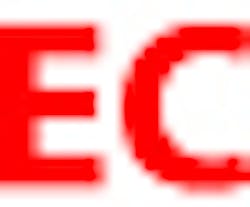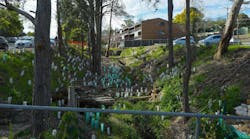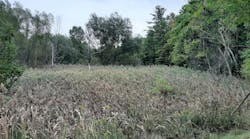I am grateful for this opportunity to update you with a summary of current activity at IECA. Over the last months, we have explored creative and new opportunities and ideas for growth, education, and economic development. We have talented staff in Denver, and our volunteers continue to dedicate valuable time and energy to improve our already exceptional educational programs. We have been busy!
Expanding IECA’s Reach Through Partnerships
IECA believes we can increase our visibility and strength through partnering with other organizations. In addition to the following, we are exploring numerous other partnerships.
We continue to partner with Engineers Without Borders (EWB) on a project in Tsurakú, Ecuador. The project is a joint venture between the Arizona State University (ASU), EWB Chapter, and IECA. IECA’s duties this year have been to provide erosion and sediment control guidance for the installation of a pipeline from a water intake structure to a water storage tank and the village school through dense second-generation Amazonian jungle. Supported by the Save Our International Land (SOIL) Fund, two IECA teams traveled to the area this past summer, one followed closely by the other. The first team included board member Tom Williams, CPESC, and Nancy Roth Williams, who assisted with pipeline installation, plant material identification and erosion and sediment control instruction. Jeff DeGraffenried and Meredith Jackson, the second team, provided hands-on soil stabilization instruction, collected geospatial positioning data, and conducted cultural discussions with the EWB team. The project was highly successful, and this small Shuar Indian village will soon have a safe drinking water supply resulting in improved health of the population. The SOIL Fund has committed to this project for the last two years, and plans are to see it through to completion next year.
In addition to the work at Tsurakú, IECA also provided watershed expertise to the Peace Corps in the town of Puyo, a regional metropolitan center for Ecuador’s Northern Orient, helping them to identify erosion and sedimentation problems and to educate the agricultural community and the local government.
IECA has resurrected its relationship with the American Society of Agricultural and Biological Engineers (ASABE) www.asabe.org. This is an educational and scientific organization dedicated to the advancement of engineering applicable to agricultural, food, and biological systems. Founded in 1907 and headquartered in St. Joseph, MI, it includes 9,000 members in more than 100 countries. For now, IECA will participate in the review of Soil and Water Division standards and participate in the society’s February 2010 workshop in California. We would like to send a liaison to the society’s June 2010 conference in Pittsburgh, PA, as well. Look for an article from one of this organization’s representatives in an IECA publication sometime soon.
Global Activity
There has been quite of bit of activity with several chapters based outside the United States. In June of 2009, Australasia ran a very successful conference in Auckland, New Zealand. By the time you read this, the South African Chapter will have held its first conference. The IberoAmerican Chapter continues with its excellent publication, Control de Erosion, the most recent issue being Año 4, Número 6, Abril de 2009.
Major progress has been made with China over the last several months through the efforts of Tony Chu, China ambassador; May Chu, administrator for the proposed chapter; Doug Wimble, past IECA president; Russ Adsit, IECA’s executive director; and others. The proposed China Chapter currently is active in dialogues with the Chinese government and other agencies. With local and national Chinese agencies, the group is sponsoring the Shenzhen International Environmental Protection Industry Development Forum in May this year in Shenzhen, China. The forum indicates a real commitment to assist and participate in combating China’s growing erosion problems.
Educational Developments
Thanks to Jimmy Eanes, our education director, I can provide an abbreviated update on our various programs. We now have a list of more than 20 committed IECA Faculty members, which allows us to mobilize the best instructors in the industry to any area of the US. We hope to expand this program to non-US chapters and members soon.
IECA is working hard to revamp its online education. We have applied for extensive grant funding to assist with the cost of building our online training, although this is still pending.
We have 78 courses (half-day and full-day classes) scheduled for EC10, and about 52 technical sessions and some exciting field trips. Peer review for IECA’s conference education is conducted by three committee members for each proposed new class and each technical presentation, so you can be assured of the quality and credibility of each course.
We have established a communication and management system of managing the IECA-CEU process. We are seeking technical reviewers who are willing to assist us in the intense process of reviewing content for national accreditation. If you are interested, contact Eanes at [email protected].
Economic Diversification
Economic diversification is essential to the health of any business, including nonprofits. As mentioned previously, we are improving our online classes. IECA has entered into an agreement with Walmart to write its online training course curriculum. We have currently completed the first of seven modules using IECA internal resources. We are creating a strong alliance with Walmart and other potential commercial developers. At this time, IECA is exploring an agreement with the Texas Association of Builders to write and deliver its training online. This partnership could reach 22,000 builders in the state of Texas.
Way to go, IECA, and keep up the good work! Thank you to our members who make these developments possible by continuing to join and support the organization. See you in Dallas.


